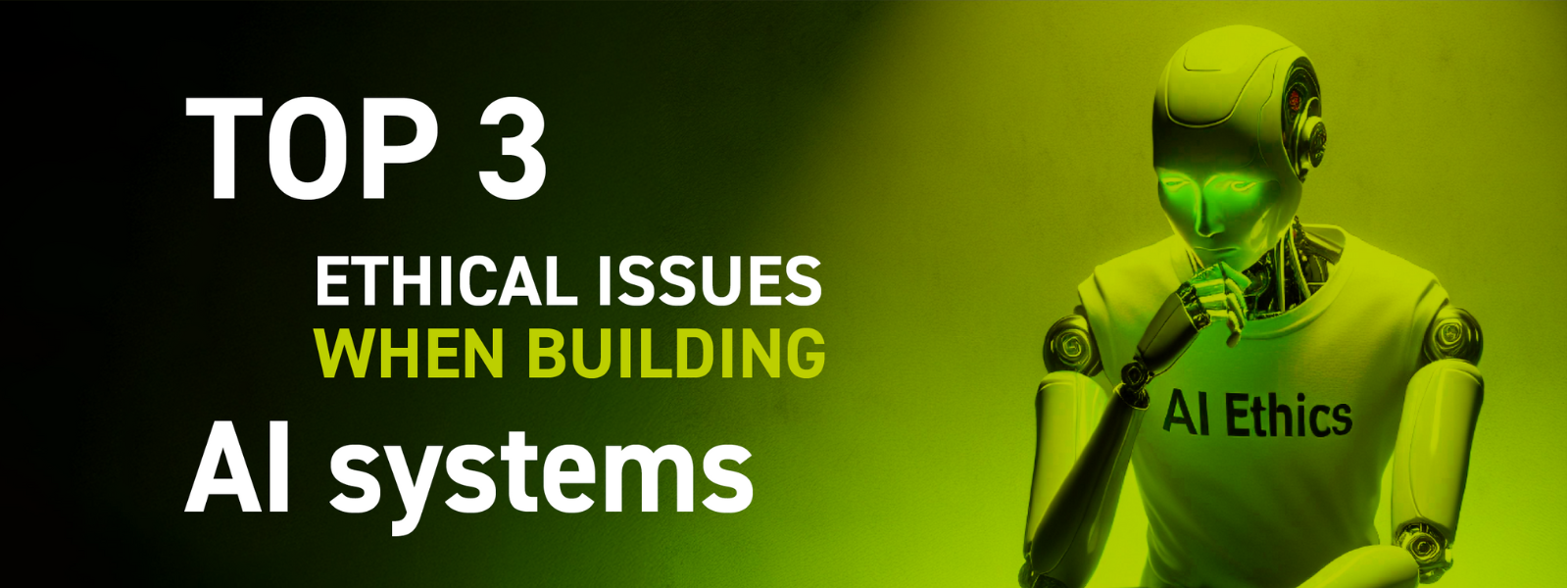
Building AI with integrity: essential ethical considerations
In an era where artificial intelligence is reshaping industries, the responsibility of IT professionals, and not just software developers, extends beyond just coding and deployment. They face the challenge of integrating ethical considerations into projects from the outset to avoid significant consequences.
The ethical implications of AI are profound and complex, demanding thoughtful consideration from the ground up. Neglecting these can lead to serious repercussions, not only harming users but also jeopardising your organisation’s reputation.
Let's explore the top 3 key ethical concerns in AI development and recommend actionable steps to ensure integrity in all your projects.


.png)
1 Bias and discrimination
One of the most pressing ethical issues in AI is bias. AI systems can unintentionally perpetuate or even exacerbate bias present in the data they are trained on. This can lead to unfair treatment of certain groups. For instance, a recruitment algorithm might favour candidates from certain demographics if the training data reflects historical hiring biases.
This can lead to discriminatory practices that perpetuate existing societal inequalities that not only harm individuals but also damage a company's reputation.
How to avoid this
Ensuring fairness requires diverse datasets and ongoing evaluation with regular audits to assess algorithmic outcomes. Begin by auditing your training data for representation and involve diverse teams during the development phase to gather a variety of perspectives and experiences. Implementing bias detection tools during development can help identify and rectify issues before deployment, so consider using fairness metrics to evaluate the model’s outcomes across different groups.
You could also consider involving interdisciplinary teams that include sociologists or ethicists to provide critical insight into potential biases.
2 Privacy concerns
Data privacy is a critical concern in AI development, particularly when handling sensitive information especially as AI often requires large amounts of personal data. Mishandling sensitive information can result in privacy breaches, legal issues and loss of trust.
For example, if an AI system inadvertently shares personal health information, the fallout can be devastating for individuals and organisations alike.
How to mitigate this
Implement robust security and data protection measures from the outset, such as encryption and anonymisation techniques to safeguard user information. Ensure compliance with regulations such as GDPR and involve legal experts during the planning stages of your projects to navigate complex data privacy laws. Strict data governance policies and transparent data usage guidelines can help safeguard personal information and by encouraging users to opt-in with clear choices regarding their data sharing, can also build trust. Regularly review and update your security protocols to address emerging threats.
3 Accountability and transparency
As AI systems become more complex, understanding their decision-making processes can become a challenge especially when the "black box" nature of many of these systems makes transparency and accountability difficult.
If an AI model makes a decision that leads to negative consequences, pinpointing accountability can be difficult. For instance, if an autonomous vehicle is involved in an accident, it raises questions about liability - who is responsible? This lack of transparency can erode trust among users and stakeholders.
Promoting transparency in AI algorithms is essential.
How to increase this
Implementing explainable AI (XAI) techniques can help demystify how models arrive at decisions from the start, allow for easier interpretation and provide insights into the decision making process. Create documentation that clearly outlines decisions and the rationale behind them. By implementing a clear framework for accountability within your organisation, covering a range of outcomes, will ensure that responsibility is well-defined and understood.
Generative AI content
How can you get the right skills and knowledge to do all these things properly?
One way, is the new qualification from the Chartered Institute for IT - the Foundation Certificate in the Ethical Build of AI.
Ideal for anyone involved with designing or developing software that uses AI.
Comprising of 5 eLearning modules, take all five and an exam to gain the certificate.
- An ethical framework for using AI
- Innovating ethically with AI to drive business change
- Data privacy, governance and policy in AI
- Data architecture, sustainability and ethics
- Building and testing AI solutions
Alternatively, individual modules can be taken on their own as independent courses.
How was the course developed and who would benefit from it?
Discover how it provides the latest knowledge on the principles of ethical design and explains the frameworks to be able to apply them when building AI systems.
This award winning course draws on insight and case studies from over two decades of AI application to explore real world risks, that can be applied across all sectors.
Hear from someone who's already taken the certification.
These modules are not just theory. You will develop a practical understanding and be given interactive tools to provide support when applying ethical decision making in the design of projects.
Want to understand how the course content can actually be applied in real life? Hear from someone already using this new knowledge and applying some of the frameworks into his work.


